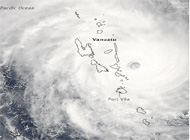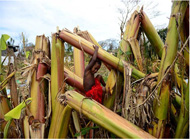March 2015
In March 13th, Vanuatu was hit by severe Tropical Cyclone Pam. This was an exceptionally wide system (640 km in diameter) with wind gusts reaching 340 km/hr. Approximately, half of the archipelago (central and southern provinces) was severely devastated with most other islands affected to some degree. While Vanuatu lies in one of the most cyclone prone parts of the south-west Pacific, it has not experienced such a cyclone of such magnitude since Cyclone Uma in 1987. The impact of more recent cyclones is generally localized, affecting one or two islands. Most climate change models are projecting less frequent but more intense cyclones in the future. This disaster would seem to provide evidence in support of these projections.
The death toll (currently standing at 24) is thankfully far less than what might have been expected considering the power of this system. The economic consequences, however, are very severe. The UN has confirmed that at least 3,300 people were displaced and up to 90% of housing has been damaged, including vital supplies of food and water. Over 90% of Vanuatu’s population live in rural areas with the country’s export earnings coming almost exclusively from agricultural products.
The Agriculture Minister of Vanuatu has highlighted their immediate need, calling for support through the short-term provision of food for the 19,000 households likely to need emergency food aid based on the storm’s path, while crops are replanted and rehabilitated. Reports also indicate that because there has not been any rain since the passing of the cyclone it is difficult to successfully replant the plant cuttings and propagules that had been saved.
PIFON is looking at ways in which we can support Farm Support Association (FSA), the National Implementing Agency (NIA) for the MTCP II programme in Vanuatu, in terms of direct rehabilitation and also for future disaster preparedness. PIFON will firstly provide some technical support to help FSA management articulate what is feasible in terms of their organisation. In this regard, a PIFON nominated consultant will be travelling to Vila on April 8th and the specific TORs for this input will include:
- Assisting FSA in writing a report on the impact of the TC Pam on their program and making recommendations for any necessary changes and additions
- Assisting FSA in the preparation of rehabilitation proposals to be implemented through the FSA network. This would be done in consultation with partner agencies such as Oxfam.
- Preparing an appropriate report for the PIFON network that focuses on lessons learnt.
Initial reports received from FSA indicate that their priority need is to help restore the income generating capability of their members on the ground. A particular focus will be on the southern island of Tanna where poultry and vegetable seedling nurseries enterprises had been established through FSA. Tanna has suffered a high level of devastation.


